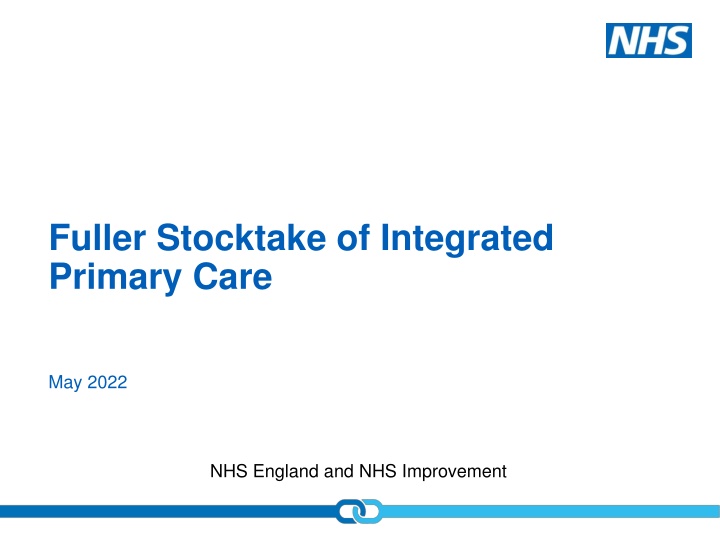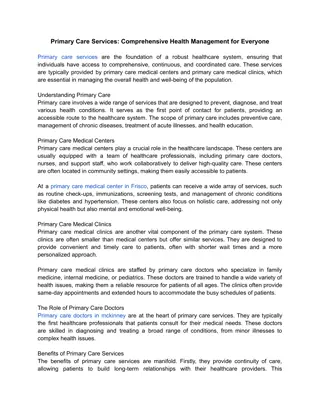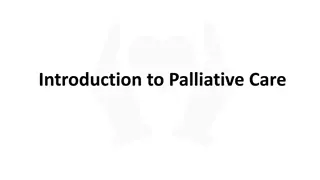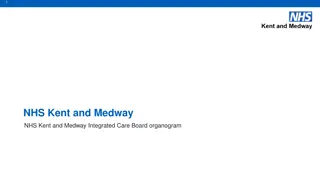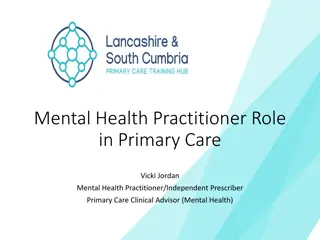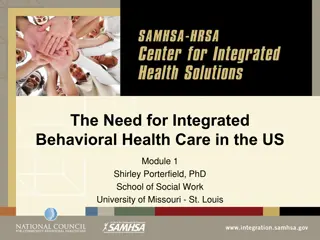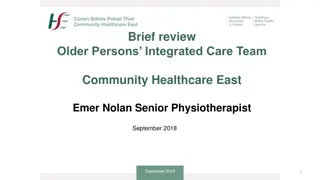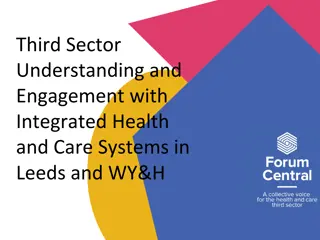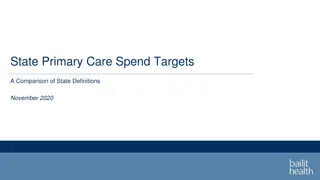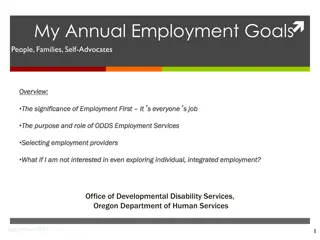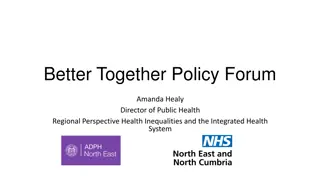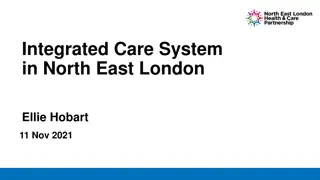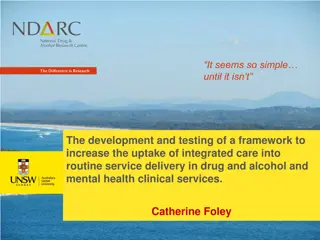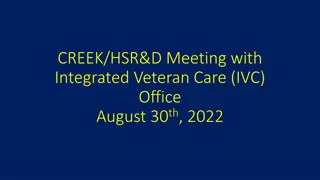Fuller Stocktake of Integrated Primary Care
Amanda Pritchard, CEO of NHSEI, tasked Dr. Claire Fuller to provide advice to Integrated Care Systems (ICSs) on advancing primary care, out-of-hospital care, and prevention ambitions. The stocktake focuses on supporting ICSs, driving integrated services at a local level, and kick-starting ICS development for improved service delivery. The report includes best practices, recommendations, and a development process for primary care capabilities within ICSs.
Download Presentation

Please find below an Image/Link to download the presentation.
The content on the website is provided AS IS for your information and personal use only. It may not be sold, licensed, or shared on other websites without obtaining consent from the author.If you encounter any issues during the download, it is possible that the publisher has removed the file from their server.
You are allowed to download the files provided on this website for personal or commercial use, subject to the condition that they are used lawfully. All files are the property of their respective owners.
The content on the website is provided AS IS for your information and personal use only. It may not be sold, licensed, or shared on other websites without obtaining consent from the author.
E N D
Presentation Transcript
Fuller Stocktake of Integrated Primary Care May 2022 NHS England and NHS Improvement
Background Amanda Pritchard, CEO NHSEI, asked Dr Claire Fuller, CEO designate Surrey Heartlands ICS and GP, on 10 Nov 2021, to provide specific and practical advice to all ICSs, as they assume new statutory form, on how they can accelerate implementation of the primary care, out of hospital care and prevention ambitions in the NHS Long Term Plan in their own geographies. The stocktake considered: What is needed for ICS to support and enable PCNs and practices to work with other parts of the health system How ICSs can drive more integrated primary, community and social care services at a local level. Practical advice on how services should develop, with next steps towards that vision. Additional purpose of the work: Kick-start ICS development relating to primary care capabilities and ability to deliver service improvements, learning from all ICSs and wider stakeholders. 2 | 2 |
Scope In scope A short, action-focused report, sponsored by ICS leaders and developed through widespread engagement across primary care Documenting best practice, including showcasing good models of integrated pathways and services that already exist Initiation of a development process for ICSs in relation to their primary care capabilities and ability to deliver service improvements Bringing together recommendations on areas of national policy or guidance that come up through engagement on the Stocktake but require further work, aligning with planned content on primary care in SoS Reform White Paper in July. Alongside this scope, an external piece of work was commissioned to the King s Fund on levers for change in primary care. Out of scope Changes to primary legislation and regulations Changes to national PC contracts Recommendations on the future of the GP partnership model Changes to Carr Hill formula 3 | 3 |
Methodology Life course workstreams How can primary care networks work best with partners across newly formed integrated care systems to meet the health needs of people in their local areas? Living & working well Ageing & dying well Starting well Vision for future model(s) of care for prevention, episodic and chronic care Workforce, people, leadership, education and training Cross-workstream discussion and analysis, supported by stocktake team and informed by wider engagement with patients, primary care, systems and other stakeholders Future vision for integrated primary care (model of care) Enabler workstreams Data: pop health data, demand & capacity, risk strat and health inequalities Working with and in communities, incl engagement Person Neighbourhood Place System Plan of action to deliver change (operating model) Physical access, incl estates: as a catalyst for PHM & for modernisation of primary care Tools, case studies & networks to spread learning and further engagement Non-physical access/digital, including remote monitoring, PHRs, virtual triage and consults Governance & decision-making, incl local contracting & funding Urgent and episodic care Mental health Prevention LDA Task and Finish Groups 4 | 4 |
Engagement approach 12,000+ visits to our public crowd sourcing platform have informed a process in which we engaged nearly 1,000 people through a combination of formal working groups, roundtables, task & finish groups and many other sessions and events 12,000+ Views of: fullerstocktake.crowdicity.com 1.5m #FullerStocktake twitter impressions 39 1-1 Meetings with ICS leaders Online platforms Directly engaged across the nine workstreams 200+ 20+ Group discussions and round tables Engagement approach 1:1 meetings Group discussion/roundtables not including workstream meetings 60+ 1-1 with other key stakeholders 5 Task and finish groups: Episodic Care; Prevention; Mental Health; LD & Autism; and Local Authorities Written submissions 5 | 5 |
What we heard Primary care is one of the great strengths of the NHS. Over a million people benefit every day from the advice and support of trusted professionals in general practice, community pharmacy, dentistry, optometry, audiology and other primary care services For the NHS as a whole to succeed, primary care must thrive. It has a crucial role in meeting the changing needs of a growing and ageing population, dealing with the disruption to routine care caused by the pandemic, and addressing persistent health inequalities. Integrated Care System (ICS) leaders strongly value primary care and are committed to working in partnership with primary care professionals to improve patient care. However, primary care is today under serious pressure. Growing demand, increasing complexity, and changing expectations have combined to put huge strain on GP services, leading to frustration for both patients and staff. While it is vital that we retain the core strengths of primary care, we also need to recognise that people s needs and expectations are changing e.g. some people need more proactive, complex care, whilst others would prefer to prioritise rapid access to advice and support We need a new approach. Fixing capacity gaps in primary care will be part, but not all, of the solution. We also need to think differently about how primary care is delivered and organised, building on innovation already being led by primary care on the ground as well as learning from the pandemic. The Fuller Stocktake sets out a new vision for integrated primary care based on developing streamlined access to urgent care for those that need it, more personalised care from a team of professionals for those with complex care needs, and a proactive approach to prevention at greater scale. This will be backed by support from both ICS leaders and national decision makers. 6 | 6 |
Outcome of work What emerged was a consensus. What is not working is access and continuity, with frustrations shared by both patients and staff alike. What also emerged was a consensus on what we can do differently. This consensus was shared by all ICS CEOs and led to a letter of commitment to the stocktake vision signed by all parties. Integrated neighbourhood teams of teams need to evolve from Primary Care Networks (PCNs), and be rooted in a sense of shared ownership for improving the health and wellbeing of the population. They should promote a culture of collaboration and pride, create the time and space within these teams to problem solve together, and build relationships and trust between primary care and other system partners and communities. Streamlined access to urgent, same-day care and advice from an expanded multi-disciplinary team, using data and digital technology to enable patients to quickly find the right support to meet their needs Ensuring those who would most benefit from continuity of care in general practice (such as those with long term conditions) can access more proactive, personalised support from a named clinician working as part of a team of professionals Taking a more active role in creating healthy communities and reducing incidence of ill health by working with communities, making more effective use of data and developing closer working relationships with local authorities and the voluntary sector. In the next few slides, more details about this vision are outlined. 7 | 7 |
The three functions of primary care A step-change in our ambitions on Preventative Care Supporting lifestyle change via a combination of national and local programmes providing advice and support to improve diet, fitness and wellbeing, eg health coaches and capitalising on evidence-based health apps, and the NHS app. This should involve the extended primary care team, harnessing the growing role of community pharmacy and dentistry in prevention, VCS, and working at scale on prevention with LA Public Health colleagues. A scaled approach to delivering population-level interventions, including screening and health checks, and adult vaccinations, building on the community engagement that characterised the Covid-19 vaccination programme. A scaled and streamlined model to deliver Urgent and Episodic Care Single, 24/7 point of coordination for urgent and episodic care, making best use of PCN and place- based MDTs, and building on CAS model. Incorporating NHS 111, community pharmacy, urgent community and mental health crisis response, GP out of hours, and potentially dentistry and other PC services. Flexibility to offer virtual or face to face options in line with patient preference and need. Delivered at a scale that makes sense for local systems, as part of a wider integrated urgent and emergency care system, enabled by risk stratification of patients and shared care records. A person-centred, team-based approach to Chronic Disease Management and Complex Care Secondary prevention, driven by proactive management of chronic disease, to prevent deterioration in health and prolong healthy life expectancy, through regular review of disease registers. Enabling and supporting people to manage their own long-term conditions, in line with latest evidence, through the use of patient-held record systems, peer coaching, remote monitoring and group clinics. Named clinician as care coordinator working alongside patients and families to ensure timely access to holistic care and minimize time spent in hospital. Co-ordination of multi-disciplinary teams/ 'teams of teams , including from acute, community and social care providers, working across place to support case management of more complex patients (medical/social/psychological). 8 | 8 |
Our vision for integrated primary care Individual access: for people and carers to professional support Individual Primary Care Providers and sites such as GP Practices will continue to play a critical role in providing ongoing support for individuals and their families. INDIVIDUAL SUPPORT PCNs as part of Neighbourhood Care Teams Population ~30 50k NEIGHBOURHOOD Delivering integrated primary care via multidisciplinary Neighbourhood Care Teams, with a focus on providing holistic care and working closely with local people and communities in order to improve health outcomes and address the wider determinants of health. Partnership working at place Population ~250 500k Delivering scaled approach to population-level primary prevention and care alongside key system partners, including outside of the health and care system, focusing on system-wide pressure points such as admission avoidance, patient discharge and flow. Creating the conditions for success Establishing an enabling leadership culture and ways of working, as well as the practical infrastructure and support to implement the vision, including through estates, workforce, PLACE Population ~1 2mil data, digital and funding initiatives. SYSTEM 9 | 9 |
Key links 1. Link to the Fuller Stocktake page on the NHS website, including report and ICS CEOs commitment letter: https://www.england.nhs.uk/primary-care/next-steps-for-integrating-primary-care-fuller- stocktake-report/ 2. Link to the King s Fund report on levers for change in primary care: https://www.kingsfund.org.uk/sites/default/files/2022-05/Levers-change-primary-care-literature- review.pdf 10 | 10 |
